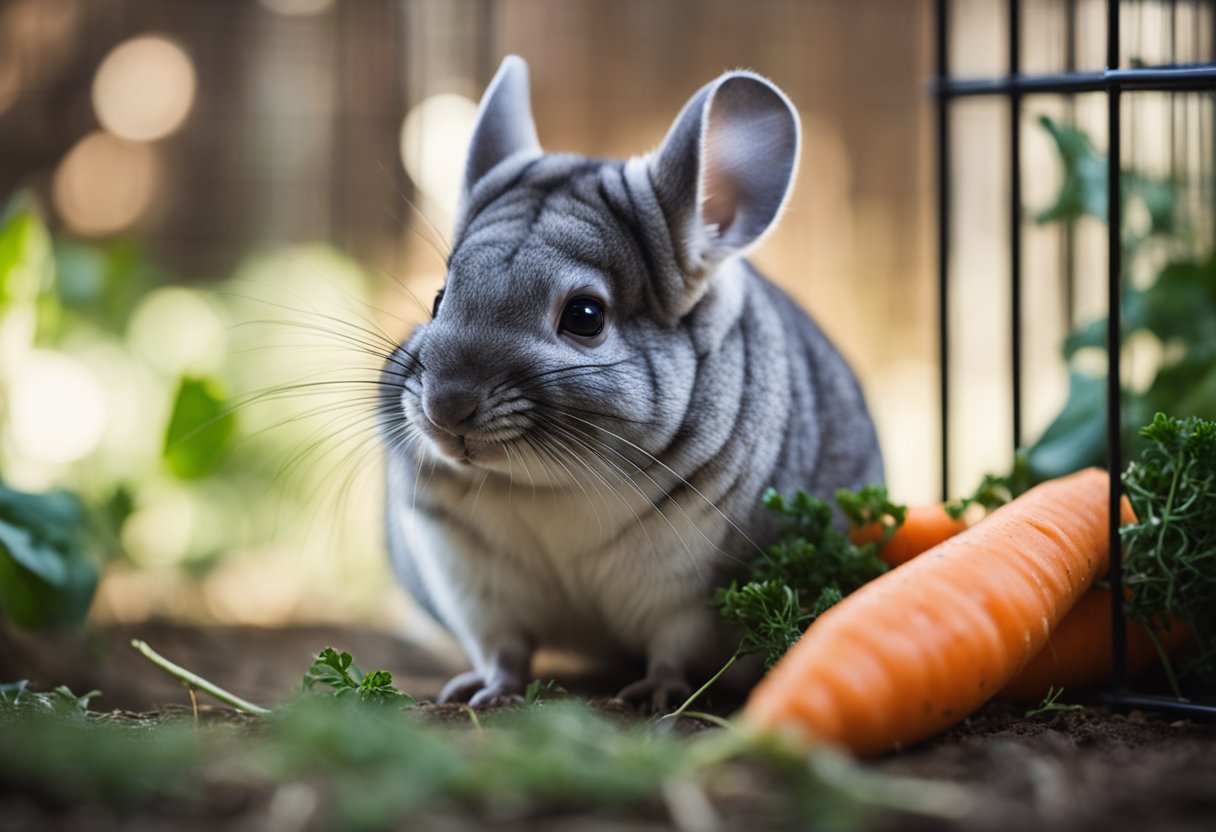Do Chinchillas Eat Carrots? Understanding Their Dietary Needs
Chinchillas are adorable pets that require a special diet to stay healthy. When considering treats, you might wonder about carrots. Chinchillas can eat carrots, but in moderation due to their high sugar content. This means you should be careful about how often you give them this snack.

Carrots can provide some vitamins and minerals beneficial to your chinchilla. However, understanding their dietary needs is crucial to maintaining their health. If you want your furry friend to thrive, knowing what treats are safe and how to prepare them is essential.
Key Takeaways
- Chinchillas can eat carrots, but only in small amounts.
- Carrots offer nutrients but can also lead to health issues if overfed.
- Always prepare treats safely to ensure your chinchilla’s well-being.
Chinchillas Dietary Needs

Chinchillas have specific dietary requirements to maintain their health and energy. A balanced diet is key to their well-being. You need to focus on providing the right nutrients while also choosing suitable treats.
Essential Nutrients for Chinchillas
Chinchillas need a diet high in fiber, moderate in protein, and low in carbohydrates. The main food for your chinchilla should be high-quality hay, like timothy or orchard grass. Hay not only provides fiber but also supports healthy digestion and dental health.
You should offer about a handful of hay daily. Pellets specifically made for chinchillas are also important. Aim for 30 to 80 grams of these pellets each day. Avoid mixes with seeds or too many additives, as they can upset your pet’s balance of nutrients.
Key Nutrients:
- Fiber: Vital for digestion; should make up most of the diet.
- Protein: Needed for growth and maintenance; includes pellets.
- Low Sugar: Minimizes the risk of obesity and dental problems.
Suitable Treats for Chinchillas
Treats for your chinchilla can include small amounts of fresh vegetables and fruits. However, these should only be given in moderation. Carrots can be an occasional treat, but limit their servings because of their sugar content.
You can also consider other vegetables, such as leafy greens or bell peppers, but introduce them slowly. Aim for treats like a quarter of a carrot once a week or a few small pieces of fruit.
Recommended Treats:
- ¼ Carrot: Once a week.
- Leafy Greens: Introduce slowly and in small amounts.
- Small Fruit Pieces: Offered no more than once a week.
Keeping your chinchilla’s diet balanced helps ensure they live a long and healthy life.
Feeding Carrots to Chinchillas

Carrots can be a tasty treat for your chinchilla, but there are important factors to consider before adding them to their diet. Understanding the potential risks and knowing how much to serve can help keep your chinchilla healthy.
Potential Risks of Carrots
While carrots contain beneficial nutrients, they also pose some risks. The main concern is their high sugar content. Excess sugar can lead to digestive problems in chinchillas, causing issues such as diarrhea and upset stomach.
Another risk is the water content in carrots. Chinchillas need a dry diet, as their digestive systems are designed for high-fiber foods. Too much water intake can disrupt their digestion and lead to health problems.
To minimize these risks, consider limiting carrot treats to small amounts. Monitor your chinchilla for any signs of digestive upset after you introduce carrots. Make adjustments to their diet based on how they react.
Proper Serving Size and Frequency
When feeding carrots to chinchillas, portion control is essential. A good guideline is to limit carrots to about 1-2 teaspoons once or twice a week. This amount helps avoid any negative effects from sugar and water.
Cut the carrots into small, manageable pieces. This makes it easier for your chinchilla to eat without choking. Always choose fresh, raw carrots rather than cooked or processed options, as these can have added sugars.
It’s crucial to observe your chinchilla after feeding carrots. If they show any signs of discomfort or digestive distress, stop feeding them this treat. Adjusting serving sizes and frequency can help maintain their overall health while still enjoying the occasional carrot.
Resources

If you’re interested in learning more about chinchilla diets, there are several reliable resources available. Here are some recommended links for further reading:
- For a comprehensive guide on chinchilla nutrition, explore Can Chinchillas Eat Carrots? (What You Need To Know. This article provides detailed information about the benefits and risks of feeding carrots to chinchillas.
- Check out Do chinchillas eat carrots? – Chef’s Resource to understand the nutritional values of carrots and the importance of moderation in their diet.
- An informative piece titled Can Chinchillas Eat Carrots? The Surprising Answer highlights how to safely include carrots in your chinchilla’s diet and what precautions to take.
- To learn about chinchillas as omnivores and their natural diet, visit Can Chinchillas Eat Carrots? What You Need to Know. It discusses their natural foods and habitat.
- For tips on integrating carrots safely into your chinchilla’s meals, read Can Chinchillas Eat Carrots? Nutritional Benefits, Risks, And Safe. This article focuses on the health aspects of carrots in their diet.
These resources can help you make informed decisions about feeding your chinchilla in a healthy and balanced way.
Frequently Asked Questions

This section addresses common questions about chinchilla diets, focusing on safe fruits, vegetables to avoid, and food preferences. You will find important insights regarding potential risks and benefits of specific foods as well.
What types of fruits are safe for chinchillas to consume?
Chinchillas can safely enjoy a variety of fruits, such as apples, pears, and blueberries. These should be given in moderation due to their sugar content. Always remove any seeds or pits before offering fruit to your chinchilla.
Which vegetables should be avoided in a chinchilla’s diet?
Avoid feeding chinchillas starchy vegetables like peas, corn, or potatoes. These can lead to digestive issues and obesity. It’s best to stick to safe options like bell peppers or leafy greens, which offer more nutrients.
How can I identify the favorite food of my chinchilla?
You can find out your chinchilla’s favorite food by offering a small variety of treats. Pay attention to which foods they enjoy eating the most. Chinchillas often show preference for certain fruits or vegetables after a few tries.
What are the dietary risks of feeding chinchillas with celery?
Celery contains a high water content and low nutritional value, which can lead to loose stools. Regular feeding of celery may disrupt your chinchilla’s digestive health. It’s wise to limit or skip celery in their diet.
Are there any benefits to including cucumber in a chinchilla’s meal plan?
Cucumber can be safe for chinchillas in moderation. It provides hydration without excessive calories. However, its high water content means you should not rely on it as a main food source.
Can feeding apples to chinchillas pose any health risks?
Apples can be a healthy treat for chinchillas if given in small slices. The seeds contain cyanide, which is harmful. Always ensure that the seeds are removed before offering apple slices to your pet.

